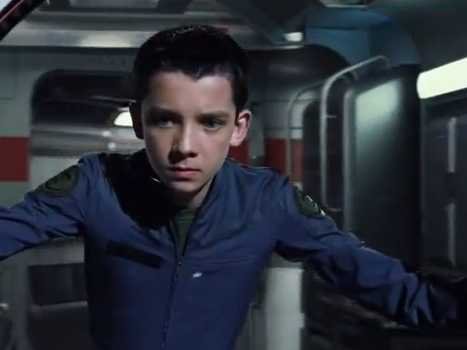Questioning ‘Ender’s Game’
 Am I the only one around here who doesn’t get the sci-fi classic?
Am I the only one around here who doesn’t get the sci-fi classic?
Thanks to the newly released teaser for the November feature film (starring Asa Butterfield of Hugo, Harrison Ford, and Sir Ben “Mandarin” Kingsley), I’m recalling my first and last read of Orson Scott Card’s novel.
It was at a 2006 writers’ conference that one editor insisted I needed to read more science fiction. Of course he was right. But among his strong sci-fi endorsements was Ender’s Game. I’m afraid if he expected Christian aspiring authors to come up with something like Ender’s Game, he was doomed to get used to disappointment.
Here’s what I recall from my one and only read:
- Fun style, yet vague worldbuilding, at least on Earth.
- The training space station was well-described, to my memory. I recognized it, especially the training space, in theis teaser.
- A sympthatic yet angsty hero (also reflected in the teaser).
- A dystopian and hopeless sense to the whole thing — contrasted with the over-the-top optimistic humanism of early Star Trek or the gritty-yet-comical revolutionary spirit of Firefly.
- Overdone “grit.” Bullies and crass references. I don’t dislike these, but to their overdone nature. Compared with other novels, the author kept things “clean,” but he must have also been asking himself: How many times can I make this reference to pee-pee?
- Slight spoiler: An expected anti-war-esque ending, necessary for the story, yet still predictable.
Given that last item, I wonder how the film will adapt this. What’s easier to show in print — spoiler again: a simulated war that, surprise! turns out to have been real all along — is much more difficult to represent on the screen.
Anyway, it may be that Ender’s Game is overrated. Or it may be that I simply don’t know the rules of this Game.







































There’s a lot of people who don’t think Ender’s Game is that great. Parts of it, maybe, but not the thing as a whole. It’s surprisingly full of Unfortunate Implications.
I love Ender’s Game and the whole Ender series. Not only does it give the reader a lot to think about, the author is a person of faith rather than a secularist Christian-basher and it shows.
Of course, not every science fiction novel is to every readers taste, but for most science fiction fans, Ender’s Game is at least worth looking at.
I read Ender’s Game last year. It’s not my favorite novel, but I do think that the twist at the end was clever. Maybe I just wasn’t smart enough to see it coming, but this is definitely a novel that you need to approach unspoiled.
To me, the basic theme of Ender’s Game is that there is no such thing as child’s play. Playing games is not necessarily fun; it is as important and serious as anything. Interpret “games” here as speculative fiction or blockbuster movies or wand-waving fantasy, whatever you like. The message of Ender’s Game is that we don’t train to do “real” deeds in the future. We are working either good or evil even as we do vain, ordinary things, such as going to school, socializing with friends — even playing video games or otherwise enjoying story and art. We need to approach the small things in everyday life with a sense of profound honor, because we are doing grim, important deeds. We are all soldiers, and if we don’t understand that we are, we are bound to fail.
That seems the best explanation of the story’s themes.
Furthermore, my initial (though reluctant) conclusion that the ending twist was “anti-war” is likely flawed. My guess, based partly on knowing the author’s religious beliefs (as a follower of a Christianity-knockoff religion based on the Bible-fanfiction The Book of Mormon), he didn’t mean it to be anti-war. Also, I certainly don’t believe that any story that questions the “glamour” of war is thereby anti-war. (Even Tolkien does this, clearly exploring both the horrors yet necessities of war in our times.)
Anyway, I’ve known for a while that I need to go back and re-read Ender’s Game.
“The message of Ender’s Game is that we don’t train to do “real” deeds in the future. We are working either good or evil even as we do vain, ordinary things, such as going to school, socializing with friends — even playing video games or otherwise enjoying story and art. We need to approach the small things in everyday life with a sense of profound honor, because we are doing grim, important deeds. We are all soldiers…”
All I can say is: this insight is deep. I’m going to post this in my house.
I haven’t read Ender’s Game yet. It stays checked out at our local library. I did try to read Wyrms–had some main character issues and just a bit of an eek factor for me.
I read it, as well as the tie-in with Bean, but it’s been a while. I thought it was interesting, but not on my top list by any means.
I think the references to “pee-pee” as Stephen puts it (which made my snort, BTW!) are totally in line with Orson Scott Card’s attempt to depict the rude humor of boys ages 7-12. Case in point: I have an 8 yr old and a 10 yr old. I cannot begin to total the number of times I hear the words “poop” and/or “butt” in a given week.
I don’t think the bullying was overdone. This was like putting a bunch of kids from dozens of countries, some rivals, into an elementary school that exhorts fighting, and then launching said school into orbit. Plus, there is ZERO parental input over these kids for the entire time they’re at the Battle School. I don’t think he exaggerated the already vicious nature of kids that age.
Just to clarify, mine is not a “dislike” or criticism of Ender’s Game. Instead I fail to see how, despite its good writing and mostly unique premise, it became such a Thing.
Mostly because of the YA craze, Stephen. It was a good novel when released, but like Brian Jacques’s Redwall series, it was rebranded as YA instead of adult, and that’s when it really seemed to take off. I think teens and adults read the book almost in two different ways.
Ender’s Game isn’t overrated; it won the Hugo award for its year, and the Ender’s trilogy is probably some of Card’s best work. It’s about thirty years old though, and with the new YA rebranding it gets, it’s isolated from its sequels Xenocide and Speaker of the Dead, which you probably should read too. Don’t bother with the rest of the books.
It’s main theme is that genius-level kids are still kids, and can be petty, tyranical, and as easily used as any child. In one sense, it’s a corrective that intelligence makes you moral; Peter Wiggin for one is an example of that.
The minimalist description was an effective stylistic choice on Scott Card’s part. The story takes place more in Ender’s head than in physical space, so “worldbuilding” would’ve been superfluous. When applied to the rest of the Ender Quartet, however, that same stylistic choice loses its power. Those plotlines are deeply dependant upon the nature of their settings, and thus would’ve benefited from far more description than Scott Card supplied.
The “grittiness” of the Battle School’s cadets serves a greater purpose than mere ‘realism.’ It highlights the fact that these soldiers, while exceptionally brilliant and numbed to violence, are still just young children who have yet to outgrow anal obsessions. As Peter Wiggin observes, he’s not an adult just ’cause he schemes like one. The reader would likely forget that distiction were he not continually reminded of it through immature potty-talk.
As for the book’s “anti-war” theme, it’s a conclusion Scott Card leaves entirely to the reader. In fact, this objectivity is one of the things I respect most about Ender’s Game. Were the IF’s measures unnecessary? Did the end justify their means? Is the argument for ‘total war’ convincing? It’s left to the reader to judge. Scott Card waits for the sequels before he starts moralizing.
To be fair Stephen, place EG next to other space-bound sci fi stories such as The Forever War (which I have not read but have been told repeatedly is very anti-war) and Robert Heinlein’s Starship Troopers, which doesn’t so much glorify war as it does the idea of serving for a greater cause. EG takes a sort of middle of the road approach. The total xenocide of the Buggers is left as is, an event which the reader can draw their own conclusions from. Perhaps give it another go…if you walk into a book thinking, “I’m told this is the greatest thing ever, thus I’m expecting it to be the greatest thing ever”, it’s likely going to fall short even if it’s a good book. I read the first Harry Potter book and couldn’t stand Harry Potter through pretty much the whole thing, despite piles of friends and family who told me how wonderful it was. I’ll give HP #1 another go (and its sequels) if you give Ender’s Game another go. And toss in Starship Troopers too…I suspect you might like that one as well. Just stay clear of the movie! Deal? 🙂